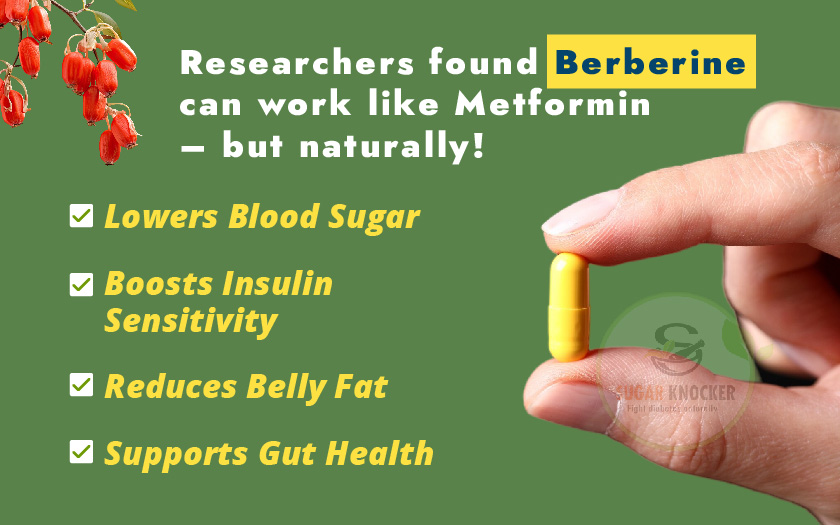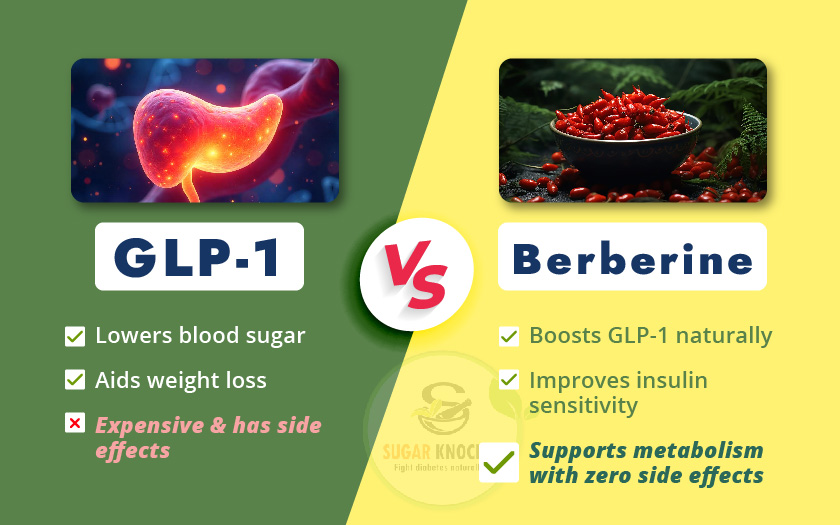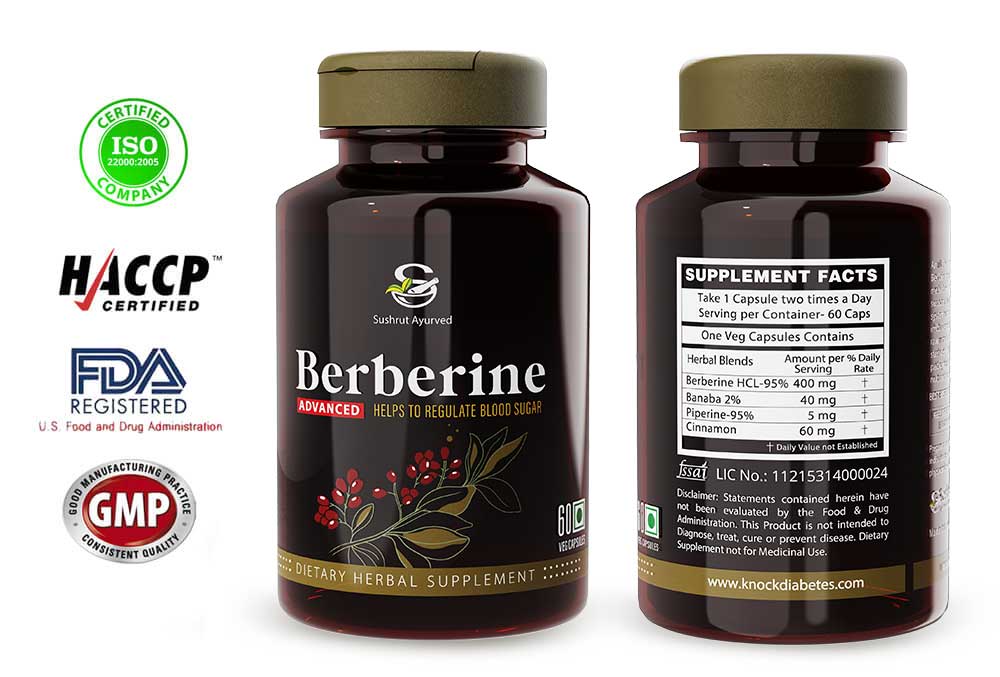
Introduction
When we talk about diabetes or high blood sugar, most people immediately think of “sugar.” But in reality, hormones play a major role in regulating how your body uses and stores sugar.
Two of the most important hormones in this process are:
In this blog, you’ll learn:
- What these hormones do
- Why insulin resistance is dangerous
- How GLP-1 helps manage both blood sugar and appetite
- And how a powerful herb called berberine can improve both insulin and GLP-1 function naturally

What is Insulin?
Insulin is a hormone produced by the pancreas. Its main job is to help your body absorb glucose (sugar) from your blood and move it into your cells, where it is used for energy.
Without enough insulin (or when insulin doesn’t work well), sugar builds up in your bloodstream — which over time can cause:
- Type 2 diabetes
- Fatigue
- Nerve damage
- Vision problems
- Heart and kidney issues
The Real Problem: Insulin Resistance
Insulin resistance means your body’s cells don’t respond to insulin properly.
It’s like trying to use a key that doesn’t fit the lock anymore. The sugar can’t get into your cells, so your body produces more and more insulin to try to force it in.
Over time, this leads to:
- High insulin levels
- High blood sugar levels
- Type 2 diabetes
- Fat storage around the belly

Meet GLP-1 – The Unsung Hero Hormone
GLP-1 (Glucagon-Like Peptide-1) is a hormone released from your intestines after you eat.
It helps you in 4 major ways:
| Function of GLP-1 | Why It Matters |
| Increases insulin release | Helps lower blood sugar |
| Reduces glucagon (sugar-raising hormone) | Prevents sugar spikes |
| Slows gastric emptying | Keeps you full longer |
| Reduces appetite | Aids in weight loss |
GLP-1 plays a powerful role in blood sugar control, weight management, and hunger regulation.
Scientific Facts About GLP-1:
- People with type 2 diabetes often have low GLP-1 levels
- GLP-1 receptor agonist drugs like Ozempic, Wegovy, and Rybelsus are designed to mimic GLP-1
- These drugs help with:
- Lowering A1C
- Reducing appetite
- Promoting weight loss
- But they can cause side effects like:
- Nausea
- Vomiting
- Constipation or diarrhea
- Risk of pancreatitis
That’s why many are turning to natural ways to support GLP-1 levels — and one of the most promising is berberine.
What is Berberine?
Berberine is a natural compound found in plants like:
- Berberis aristata (Daruharidra)
- Goldenseal
- Tree turmeric
It has been used for over 3000 years in Ayurveda and Traditional Chinese Medicine to treat various health issues, especially blood sugar imbalances.

Research-Backed Benefits of Berberine:
Blood Sugar Control
- Works similarly to metformin, a common diabetes drug
- Reduces blood glucose by improving insulin signaling
- Lowers HbA1c levels (a 3-month average of blood sugar)
Increases Insulin Sensitivity
- Helps cells respond better to insulin
- Reduces insulin resistance, the root cause of type 2 diabetes
Boosts GLP-1 Naturally
- Stimulates GLP-1 release from intestinal cells
- Helps regulate appetite and reduces sugar cravings
Weight Management
- Berberine activates AMPK, known as the “metabolic master switch”
- Helps break down fat and supports fat loss

Comparison: Berberine vs GLP-1 Drugs
| Feature | GLP-1 Drugs (Ozempic, etc.) | Berberine (Natural) |
| Source | Synthetic | Plant-based (Ayurvedic) |
| Boosts GLP-1 | Yes | Yes (mild but steady) |
| Improves Insulin Sensitivity | Yes | Yes |
| Helps Weight Loss | Yes | Yes |
| Side Effects | Nausea, vomiting, bloating | Rare (mild GI issues) |
| Long-term Use | Costly & requires prescription | Safe & affordable |

How to Naturally Improve Insulin & GLP-1 Function
Here are some natural and simple habits that support insulin and GLP-1:
Herbs and Natural Compounds
- Berberine
- Fenugreek (Methi)
- Bitter Melon (Karela)
- Cinnamon
- Gurmar (Gymnema Sylvestre)
Diet
- High-fiber foods (vegetables, lentils, whole grains)
- Low glycemic index foods
- Avoid processed sugars and refined carbs
- Include healthy fats like nuts, seeds, and ghee in moderation
Movement & Exercise
- Walk for 30–45 minutes daily
- Do strength training or yoga 3x per week
- Exercise improves insulin sensitivity for up to 24 hours
Sleep & Stress
- Poor sleep increases insulin resistance
- Stress raises cortisol, which raises blood sugar
- Meditate, do deep breathing, and aim for 7–8 hours of quality sleep
Final Summary
| Insulin | Hormone that helps sugar enter cells for energy |
| Insulin Resistance | Main cause of type 2 diabetes — cells stop responding to insulin |
| GLP-1 | Hormone that increases insulin, lowers appetite, and slows digestion |
| Berberine | Plant-based compound that improves insulin function and boosts GLP-1 |
| Natural Support | Herbs, food, exercise, sleep, and stress reduction all help regulate blood sugar |
What is GLP-1 and why is it important for blood sugar control?
GLP-1 (Glucagon-Like Peptide-1) is a hormone your body produces after eating. It helps lower blood sugar by increasing insulin, slowing digestion, and reducing appetite — making it crucial for people with diabetes or insulin resistance.
How does Berberine affect GLP-1 levels?
Berberine naturally boosts GLP-1 secretion in the body. This improves insulin release, slows down carbohydrate digestion, and helps maintain stable blood sugar levels.
Is Berberine as effective as prescription diabetes medications?
Studies have shown that Berberine can work similarly to Metformin, a common diabetes drug. It improves insulin sensitivity and reduces blood sugar levels — without the side effects associated with some medications.
Can I take Berberine if I’m already on diabetes medication?
Yes, but it’s important to consult your doctor before combining Berberine with prescription meds, as it may enhance their effects and cause your blood sugar to drop too low.
Are there any side effects of using Berberine?
Berberine is generally safe when taken in recommended doses. Some people may experience mild digestive discomfort initially, which usually goes away with time or after meals.
How long does it take for Berberine to show results?
Many users begin to notice changes in blood sugar levels within 2–4 weeks of consistent use. However, results may vary depending on your diet, lifestyle, and overall health condition.
Is Berberine suitable for weight loss?
Yes! Since Berberine helps increase GLP-1, it can reduce appetite and improve metabolism — both of which support natural and healthy weight loss, especially in people with insulin resistance.
Can GLP-1 be improved without drugs?
Yes. Lifestyle changes like eating more fiber-rich foods, regular exercise, and natural supplements like Berberine have been shown to naturally improve GLP-1 levels.
What is the best time to take Berberine supplements?
For best results, Berberine should be taken 2–3 times a day before meals. This helps regulate blood sugar spikes that occur after eating.
Is Sugar Knocker Berberine Advanced different from regular Berberine?
Yes. Sugar Knocker Berberine Advanced is formulated with high-potency 500mg capsules and is 100% vegetarian. It’s specially designed to support GLP-1 function, insulin sensitivity, and natural blood sugar balance.
Conclusion
Understanding your body’s hormones — especially insulin and GLP-1 — is the first step in taking real control of your blood sugar levels.
While modern medicine offers powerful tools, nature has always had its answers. Compounds like berberine have stood the test of time in traditional systems like Ayurveda and now have modern science backing their benefits too.
By focusing on natural herbs, nutritious food, daily movement, and stress-free living, you can:
- Improve your insulin sensitivity
- Boost GLP-1 naturally
- Support your body’s natural ability to balance sugar
- And most importantly, feel more energetic and in control of your health
You don’t need to rely only on medications. You have the power to heal, reverse, and reclaim your health — one smart choice at a time.



